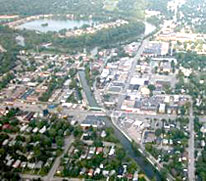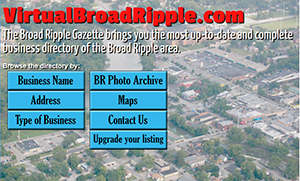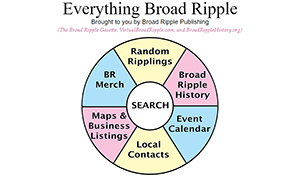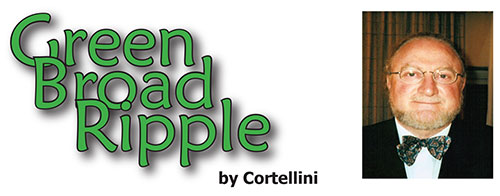
|
Broad Ripple Random Ripplings

The news from Broad Ripple
Brought to you by The Broad Ripple Gazette
(Delivering the news since 2004, every two weeks)

|
| Brought to you by: |

|

|

|

|

|

|
Converted from paper version of the Broad Ripple Gazette (v04n03)
Green Broad Ripple - Buildings-Regulations - by Cortellini
posted: Feb. 09, 2007

Buildings-Regulations
The right to own property and do with it as we like is considered by many Americans to be one of those unalienable rights endowed to us by our creator. Nothing should be allowed to abridge this right, for it is the cornerstone of our precious freedom. The 20th century, however, brought us the Industrial Revolution and explosive urban growth, which made obvious the need to bring some order to the process. Thus, building regulations were born in America as the community acquired the right to dictate certain aspects of the built environment. Today, the tension between individual rights and the rights of the community is rarely more apparent than in the issues of buildings and their regulation.
The number of building regulations has grown exponentially as our culture has increased in complexity. Generally these regulations are one of three types; statutory, contractual, and voluntary. Statutory standards are developed by career planners and code industry professionals. The regulations consist of standards covering local, state, federal, building and land use regulations which are intended to protect life, safety, health and welfare of the public. Once formally adopted by the appropriate authority, building standards become codes and acquire the force of law. The State of Indiana administers the Indiana Building Code through the Indiana Fire and Building Safety Administration. The county administers a zoning ordinance through the Metropolitan Development Commission for the purpose of regulating land use according to the intentions of a master plan. Cities and municipalities often add another layer of local regulation, such as the standards administered by the Indianapolis Historic Preservation Commission. While codes do much to promote order, safety, and preservation, their bulk and complexity are expensive to support and maintain. Even so, codes seem always to be a bit behind the curve, with their authoritative bureaucracies at work, codes often impede and frustrate the new and innovative.
Contractual regulations take the form of covenants. These are prepared by attorneys. A covenant is a contractual condition placed on the purchaser of property which restricts the style, size or type of building that he/she may erect. Covenants often regulate building materials, time of commencement and completion, vegetation preservation, fencing restrictions, and condition of resale. The most evolved and restrictive covenants are employed by gated communities which, beyond regulating building requirements, may even regulate acceptable human behavior. These regulations are enforced through the power of the civil court.
Widespread concern for the state of the environment has fostered a new egalitarian form of building regulation that is based on voluntary compliance. The US Green Building Council (USGBC) was established some ten years ago with the overarching goal, shared with other environmental organizations, of reversing the rate of destruction of the environment. Along with his environmental passion, Rick Fedrizzi, founder of the USGBC, brought with him a thorough understanding of the business of building and a genius for organization and efficiency. In its ten years of existence, the USGBC has emerged as one of the leaders in the development of Green Building Regulations. Termed the "LEED Green Rating System", this set of regulations developed by the USGBC is comprised of design guidelines rather than building standards. Being consensus driven, the LEED (Leadership in Energy and Environmental Design) development process gathers many diverse and voluntary opinions from the myriad of industries and interests associated with the building industry, while making the best use of information technology to distill these opinions to workable rules for the development of green buildings. The voluntary nature of development of and compliance with these rules is not just incidental, but is crucial to their effective acceptance and implementation in the marketplace. While LEED is the instrument of implementation, the numerous USGBC symposiums and workshops, publications such as "The Business Case for Going Green", connections and partnerships with major industry players, and the yearly International Conference and Expo "Greenbuild" help to create a compelling vision of a hopeful Green future.
Broad Ripple can share in this hopeful future even though it has no official power of self-determination, little political influence, no genuine autonomy, and few means for gathering resources. Broad Ripple does have resources. Among its citizenry are creative individuals with a strong affection for this place who continually give of themselves to the benefit of the community. They know from experience that volunteer efforts, in every way, can be more efficient and effective than any other. It will be through the voluntary commitment of local individuals and businesses to the emerging restorative global initiative that Broad Ripple will realize its own green destiny.
Cortellini is a licensed architect in the states of Indiana and Arizona. He holds a BFA from Indiana University Herron School of Art. He has taught architectural technology at the college level at several universities and has pursued independent artistic endeavors. His architectural practice has focused on residential and small commercial projects. He has recently committed his practice to designing Green buildings, is a member of the US Green Building Council and is a LEED Accredited Professional. Send questions/comments to cortellini@BroadRippleGazette.com
cortellini@broadripplegazette.com

|

|

|
| Brought to you by: |

|

|

|
| Brought to you by: |

|

|

|


